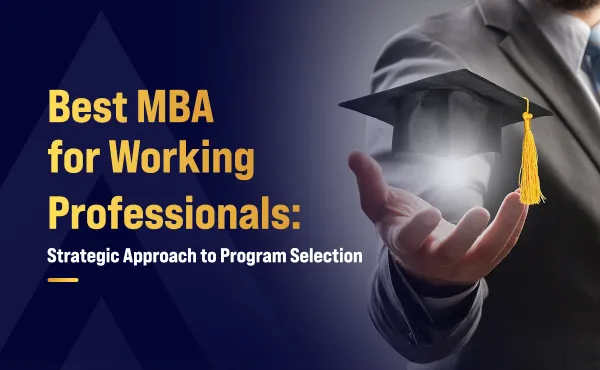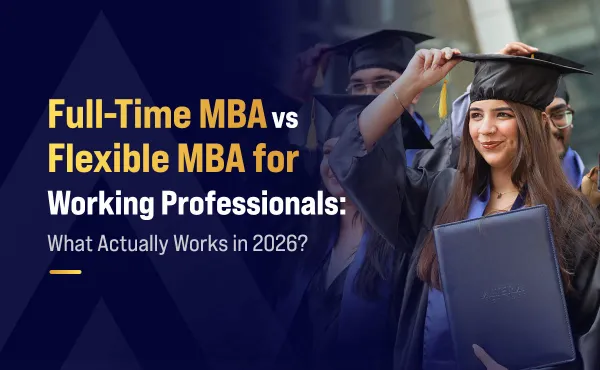Is It Better to Do an MBA After Work Experience?

India’s MBA landscape in 2025 is in flux, driven by rapid shifts in employability and career expectations. With employability rates rising from 47% to 78% between 2021 and 2025, MBAs are seen as a prized asset for ambitious professionals, yet half of all graduates continue to struggle for quality placements and tangible ROI.
For working professionals and fresh graduates, the decision of when to pursue an MBA is more crucial than ever, balancing job market realities, career aspirations, and timing for maximum impact. Today's recruiters actively seek candidates who demonstrate clarity and sound reasoning behind pursuing an MBA, alongside proven workplace skills, adaptability, and enthusiasm.
Concerning the value of work experience in the MBA context, you are already in the right direction. Direct work experience will help you reap far more out of such a graduate program. It is this perspective that the PGP in Marketing at Altera Institute is designed for.
The program prioritizes working professionals and their needs through applied industry-focused, 'live' projects and tailored support that aids in achieving role transitions, leadership unlocks, and accelerating career jumps. Your experience is a strong asset that this program is motivated to convert into better employment opportunities.
Hence, this article will examine key statistics, pros and cons, and the strategic decision-making behind pursuing an MBA.

The MBA Landscape in India
- Most full-time MBA programs in India do not mandate work experience as an eligibility requirement, with this criterion being exclusively reserved for only Executive MBA programs.
- Average pre-MBA professional exposure for students in India has climbed from 0.8 years in 2018 to 1.3 years in 2022.
- Top IIMs report that almost 60% of their students have work experience of more than two years.
- Most IIMs allocate 5% to 10% weightage to work experience, with candidates having 24–36 months of post-graduation professional exposure receiving the highest consideration in this criterion.
- As per the GMAC Global Graduate Survey Report, MBA alumni possessing three to six years of prior professional engagement can anticipate an 83% surge in their earning potential.
- The Financial Times Global MBA Ranking 2025 notes a striking 187% salary increase for Indian MBA graduates within a three-year post-graduation window.
These figures demonstrate that while Indian full-time MBA programs remain accessible to fresh graduates, acquiring 2-4 years of work experience significantly boosts admission prospects, salary growth, and post-MBA career outcomes. The data underscores that work experience is a powerful lever for maximizing the financial and professional returns on an MBA in India.
When is the Best Time to Pursue an MBA?

The optimal timing for an MBA in India is highly personal, but data reveals clear patterns that can guide your decision. For graduates and working professionals, the 2-to 4-year experience window emerges as the strategic sweet spot, where you have gained sufficient business exposure without becoming overqualified for the traditional 2-year program.
- Fresh Graduates: Pursue an MBA immediately if you have crystal-clear career objectives, exceptional academic credentials, and readiness to begin in entry-level management roles. Do not let inexperience deter you, as top MBA colleges do not require work experience as an eligibility criterion and admit substantial numbers of freshers who demonstrate potential through strong CAT scores and leadership qualities.
- Working Professionals: The optimal window, as mentioned, lies within 2-4 years of professional experience. At this stage, you have grasped business fundamentals, recognized your skill deficiencies, and can add valuable perspectives to academic discourse while staying receptive to new learning frameworks. Note that after 5-6 years, Executive MBA programs align better with your professional stature.
- Industry-Specific Timing: Technology and consulting professionals can benefit from earlier entry (2-3 years), while those in manufacturing or operations might find 4-5 years more valuable for understanding complex processes.
In the end, your personal readiness indicators should drive your timeline by assessing whether you have clear post-MBA goals, can handle financial investment without excessive stress, and are mentally prepared for intensive academic demands. If these factors align with your experience level, you have found your optimal timing.
Remember, successful MBA outcomes depend more on strategic clarity than perfect timing. Whether you are a motivated fresh graduate or an experienced professional seeking advancement, align your MBA pursuit with concrete career objectives rather than conventional wisdom.
Advantages of Pursuing an MBA After Work Experience
In India, pursuing an MBA after gaining 2 to 3 years of work experience helps convert classroom theories into a practical learning experience, accelerating salary growth, improving placement prospects, and unlocking leadership roles. Below are key benefits of undertaking an MBA following the accumulation of professional experience:
1) Enhanced Earning Potential and Career Acceleration
Imagine compressing years of incremental salary growth into a single career move. MBA graduates bringing 3-6 years of professional background can anticipate a 83% earnings surge, with experienced candidates typically commanding higher salaries compared to fresh entrants. This accelerated earning trajectory ensures quicker investment recovery and dramatically enhanced long-term wealth accumulation prospects.
2) Superior Placement Outcomes and Leadership Roles
Work experience provides a distinct advantage in the job market:
- Direct recruitment for mid-to-senior level positions rather than entry-level roles.
- Premium salary packages with better negotiation leverage.
- Leadership positions that match your professional maturity.
- Lateral placements in specialized domains like consulting, finance, marketing, and product management.
3) Experiential Learning Amplification
Your existing career foundation converts academic concepts into directly applicable wisdom. Real-world experience enables you to relate theoretical frameworks to actual business scenarios, making case studies and group discussions significantly more meaningful. You contribute valuable perspectives while absorbing advanced concepts with practical context.
4) Strategic Career Navigation
Professional exposure crystallizes your aptitudes, blind spots, and genuine career passions. This self-awareness becomes your compass for selecting optimal specializations, targeting aligned industries, and presenting compelling, evidence-backed career narratives during recruitment conversations and professional networking engagements.
5) Compounded Resource Advantage
Your established professional ecosystem evolves into a strategic asset throughout your MBA expedition and beyond. Accumulated earnings create financial breathing room, minimizing debt burdens and enabling pure academic focus without monetary anxiety. Corporate sponsorship opportunities from current employers further amplifies this advantage.
6) Accelerated Recruitment Pathway
Hiring managers perceive seasoned candidates as investment-ready assets for leadership roles, often bypassing lengthy evaluation phases. Your demonstrated competence in managing workplace complexities, meeting critical deadlines, and orchestrating team dynamics positions you as an immediately deployable management resource for growth-focused organizations.
Disadvantages of Pursuing an MBA After Work Experience
While pursuing an MBA after gaining work experience offers several advantages, there are also notable downsides that graduates and working professionals in India should carefully consider before making this commitment.
1) Significant Opportunity Cost and Financial Strain
The most pronounced drawback involves abandoning a reliable earnings trajectory for educational pursuit. Experienced professionals sacrifice 2-3 years of career advancement and salary increments, typically valued at ₹8-15 lakhs per annum. For graduates who have established secure professional foundations, this represents a significant financial regression, particularly challenging when shouldering family responsibilities or servicing existing financial obligations.
2) Academic Reintegration Challenges
Transitioning back to academic environments after professional immersion creates unexpected hurdles for numerous candidates. This adjustment encompasses:
- Adapting to rigid academic timetables after enjoying workplace autonomy.
- Managing group projects and peer dynamics with younger classmates.
- Absorbing theoretical concepts when you are accustomed to practical problem-solving.
- Competing academically while revitalizing dormant learning methodologies.
3) Professional Momentum Disruption
Extended academic sabbaticals can disrupt your career trajectory's natural flow. Technical competencies risk becoming obsolete, and industry peers advance their positions while you remain academically occupied. This phenomenon proves especially detrimental in rapidly transforming domains like technology and digital marketing, where sustained industry immersion determines competitive relevance.
4) Age-Related Placement Challenges
Senior MBA candidates occasionally encounter implicit age discrimination during campus recruitment cycles. Organizations pursuing "emerging talent" for specific functions may gravitate toward younger applicants, constraining opportunities despite your enhanced professional depth. This contradiction transforms your experiential advantage into a potential recruitment obstacle.
5) Over-Qualification Risk and Role Mismatch
Certain employers perceive seasoned MBA graduates as excessively credentialed for existing vacancies or anticipate immediate executive-level contributions without offering commensurate onboarding assistance. This disconnect frequently generates workplace frustration or establishes unreasonable performance benchmarks from the outset.
Is Pursuing an MBA Right After Graduation a Smart Choice?
For graduates and early-career professionals in India, jumping straight from a bachelor’s degree into an MBA program can be both exhilarating and challenging. Whether this path is “smart” depends on individual goals, readiness, and market dynamics. Below are key considerations to help evaluate if an immediate MBA aligns with your aspirations.

1) Clarity of Career Vision
Start by defining clear professional goals and the specific roles you want to pursue, whether in strategy consulting, brand management, or social entrepreneurship. Having a focused vision helps you select the right MBA specialization, tailor your internship choices, and present a compelling narrative during the interview process.
2) Practical Exposure Through Internships
Without work experience, you will need to actively build a portfolio demonstrating real-world exposure. Consider securing summer internships or live projects while applying for MBA programs, volunteering for student consulting roles or campus business ventures, and joining case competitions that connect classroom theory with practical business challenges.
3) Academic and Soft Skill Readiness
Certain foundational skills deserve attention before starting your MBA journey. Strengthen your analytical abilities through data analysis and financial modeling courses or intensive bootcamps. Meanwhile, build communication and leadership confidence by leading student groups, organizing campus events, and honing your public speaking abilities.
4) Networking Strategy
Building relationships early opens doors to valuable industry insights and mentorship opportunities. Reach out to program alumni to understand career paths and placement trends. Attend MBA fairs and industry webinars to connect directly with recruiters and seasoned professionals. Use LinkedIn strategically by sharing thoughtful content that demonstrates your business acumen.
5) Financial Planning and ROI Assessment
Smart financial planning becomes essential when considering an MBA investment. Carefully weigh program costs, living expenses, and expected post-graduation salaries to make an informed choice. Research available scholarships, student-friendly loan options, and part-time work possibilities while creating a realistic plan for earning back your investment.
By systematically addressing these preparation areas, fresh graduates can transform their limited professional experience from a perceived limitation into a compelling MBA application strength, ultimately creating a foundation for accelerated career advancement.
FAQs
Q1. What is the right time to do an MBA?
Ans: There is no universally optimal timing for MBA pursuit. For candidates seeking specialization clarity, accelerated compensation growth, and enhanced placement prospects, 2-4 years of relevant professional experience represents the ideal window.
Those prioritizing immersive campus engagement and early career transitions may find the direct undergraduate-to-MBA pathway more suitable. Your choice ought to be guided by your professional aspirations, financial situation, and the specific criteria of your chosen programs.
Q2. How many years of work experience is good for an MBA?
Ams: Two to three years represents the most optimal window for pursuing a traditional MBA program. It provides essential context, establishes credibility, and provides sufficient career flexibility for strategic pivots. Executive formats typically mandate seven-plus years of experience, while select programs also welcome exceptional fresh graduates.
Q3. What are the comparative advantages of a full-time versus a part-time MBA program?
Ans: If you can afford to pause work and want a rapid career pivot, a full-time MBA gives the strongest placement access and immersive experience. If you cannot leave work or want to maintain income while learning, part-time or executive formats allow learning without career interruption. Hence, your choice must depend on immediate goals, finances, and family constraints.
Summing Up
As India's MBA landscape evolves with changing career expectations, strategic planning has become paramount for maximizing your educational investment. The decision between immediate enrollment versus gaining professional experience requires careful evaluation of personal aspirations, industry dynamics, and individual readiness levels.
Although both pathways offer distinct advantages and present unique challenges, success depends on aligning your MBA journey with well-defined objectives and thorough preparation.
In today's competitive environment, meaningful career advancement extends beyond the degree itself. Your ability to leverage accumulated experience, professional networks, and acquired knowledge to demonstrate agility, competence, and leadership potential determines long-term success in India's dynamic business landscape.





